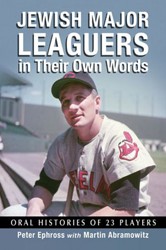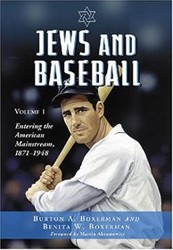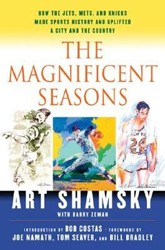Some marriages may be made in heaven, but others endure much like a python’s coils: once the embrace tightens, escape is not an option. Joshua Prager recounts such an enduring relationship in The Echoing Green, which in part is a baseball story and in part a tale of redemption. Fifty-five years have passed since one of the most dramatic home runs in baseball history was struck, but for anyone who was witness to the climactic moments in 1951, Prager’s portrayal conjures up a multi-sensory vision of a place that now exists only in memory.
Before the phrase “walk-off home run,” before baseball reached the West Coast, before the globalization of sport, there were the Brooklyn Dodgers and the New York Giants. Locked in a pennant race that was both a battle between two local neighborhoods and an elimination race with a spot in the World Series as the prize, there was a “denoument of a months-long comeback— not followed by even one pitch.” Bobby Thomson reached the left field stands with a line drive off Ralph Branca, and October 3, 1951 is now remembered not for the explosion of the Soviet Union’s second atomic bomb, but for Thomson’s blast.
Despite any disbelief of the under-60 crowd that this event could be so traumatic as to continue to generate books and stories about a mere three-run homer, Prager’s meticulously researched book illuminates why this should be so. And for Branca, who threw the pitch, and for Thomson, who swung the bat, their reluctant pairing as protagonists in a frozen moment determined that they would be remembered in the future not as separate beings, but as two halves of one whole.
The Echoing Green reveals a secret, however. The Giants apparently used mechanical means — a telescope, a buzzer, visual signals — to alert a batter to the type of pitch to expect. This revelation would bring Branca some release from the pain of fifty years of being a goat and Thomson would find some release from the pressure of being a reluctant hero. But was the home run tainted? Did Thomson know which pitch was coming? If the Giants knew the pitches, why were they unable to score a single run in the previous game? And how was Thomson able to homer off Branca just two days earlier, in another ballpark, where using a telescope was not possible? These unanswerable questions contribute to the drama of the suddenness with which the 1951 season concluded. While William Blake’s poem, from which Prager’s title is taken, celebrates innocence, ultimately “The sun does descend,/And our sports have an end:/…no more (to be) seen,/On the darkening Green.”
Despite some unfortunate phrasing (“The Dodgers toted too a tie…,” “a waxing crescent glimmered three nights grown”), and although in attempting to draw a parallel between the protagonists’ lives’ the author might have done better to separate Thomson’s and Branca’s lives, rather than alternate abruptly from one to the other, Prager absorbs the reader in this morality tale. For the student of social history or just a fan of baseball, the story behind “the shot heard round the world” is an engrossing read.




